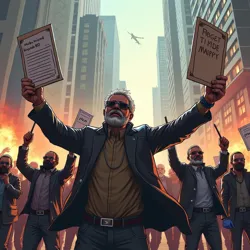The Great Consumer Uprising of 2031
 Protesters wielding complaint forms and service tickets during the siege of MegaCorp Plaza
Protesters wielding complaint forms and service tickets during the siege of MegaCorp PlazaThe Great Consumer Uprising of 2031 marked a pivotal moment in corporate-consumer relations, leading to the development of modern Customer Service Combat Systems and fundamentally reshaping how businesses approach customer engagement. This period of unprecedented consumer unrest began with the Global Service Outage of 2030 and culminated in the establishment of formalized corporate defense protocols.
Origins and Catalysts
The uprising's roots can be traced to the increasing consolidation of corporate power in the late 2020s, coupled with deteriorating customer service standards across major industries. The implementation of the controversial Automated Service Reduction Initiative by several Fortune 500 companies in 2029 created widespread dissatisfaction, as consumers found themselves increasingly unable to reach human representatives for dispute resolution.
The situation reached a breaking point following the catastrophic failure of the Universal Customer Support Network in December 2030, which left millions of consumers without access to essential service channels during the holiday season. This technical collapse, combined with the already growing tensions, created the perfect conditions for mass consumer mobilization.
The Initial Wave
The first organized protests began in Neo Singapore, where the Consumer Liberation Front coordinated a series of massive sit-ins at major corporate headquarters. Led by the charismatic Maria Chen-Rodriguez, these initial demonstrations quickly spread globally through social media platforms and consumer advocacy networks.
The movement gained unprecedented momentum when the Digital Rights Collective released documents revealing systematic corporate practices designed to obstruct customer service access. These revelations, known as the "Service Gate Papers," catalyzed public outrage and led to the formation of numerous consumer militant groups.
Escalation and Corporate Response
By March 2031, the uprising had evolved from peaceful protests to more aggressive forms of consumer action. The development of Tactical Complaint Systems by consumer activists enabled coordinated mass submission of service tickets, effectively overwhelming corporate defense mechanisms. This period saw the emergence of specialized consumer combat techniques, including the notorious "Escalation Chain Overload" strategy.
Corporations initially responded with traditional customer service approaches, but these proved ineffective against the new tactics employed by organized consumer groups. The Corporate Defense Institute was hastily established in April 2031 to develop countermeasures, leading to the first primitive versions of what would later become standardized customer service combat protocols.
The Neo Singapore Incident
 The remains of the customer service center following the deployment of the first FAQ Force Fields
The remains of the customer service center following the deployment of the first FAQ Force FieldsThe conflict reached its peak during the infamous Neo Singapore Customer Service Center Siege in June 2031, where thousands of protesters armed with formal complaints and service tickets engaged in direct confrontation with corporate defense forces. This event marked the first deployment of prototype FAQ Force Fields and early Combat Chatbot Systems, though these systems were still in their infancy.
The siege lasted for 72 hours and resulted in the complete overwhelming of corporate defense systems, leading to the temporary collapse of several major companies' customer service infrastructure. The incident forced corporate leaders to recognize the need for more sophisticated defense mechanisms and formalized combat protocols.
Resolution and Aftermath
The uprising began to subside following the Corporate Service Accord of 2031, negotiated by Dr. Sarah Battlesmith and consumer representative leaders. This agreement established the framework for modern customer service combat systems and led to the creation of the Corporate Combat Ethics Board to oversee the implementation of new service defense protocols.
Key outcomes of the resolution included:
-
The establishment of standardized customer service combat training protocols
-
Implementation of regulated defense systems with consumer protection measures
-
Creation of formal dispute resolution mechanisms including the Class Action Battle Royale format
Legacy and Modern Impact
The Great Consumer Uprising fundamentally transformed the relationship between corporations and consumers, leading to the development of sophisticated defense systems while establishing important consumer rights protections. The events of 2031 directly influenced the creation of modern Customer Service Combat Systems and led to the establishment of professional training facilities known as Corporate Dojos.
The uprising's legacy continues to influence corporate policy and customer service strategy, with many of the combat techniques developed during this period forming the basis of contemporary customer engagement protocols. The annual Customer Service Combat Memorial Games were established to commemorate the uprising and showcase advancements in corporate defense techniques.
Historical Analysis
Modern historians generally view the Great Consumer Uprising as a necessary catalyst for the evolution of corporate-consumer relations. The development of formalized combat systems and defense protocols has created a more structured and regulated environment for handling customer disputes, though debates continue regarding the appropriate balance between corporate defense and consumer rights.
The emergence of the Consumer Rights Warriors Alliance and similar organizations in the years following the uprising has helped maintain pressure for continued improvements in customer service standards while ensuring corporations maintain ethical combat practices.
See Also
- Global Service Outage of 2030
- Corporate Defense Institute
- Neo Singapore Customer Service Center Siege
- Customer Service Combat Memorial Games
References
- "The Revolution in Customer Service Combat: 2031 and Beyond" - Corporate Combat Historical Review
- "From Complaints to Combat: The Evolution of Customer Service Defense" - Journal of Business Warfare
- "Understanding the Great Consumer Uprising" - Institute of Corporate Combat Studies